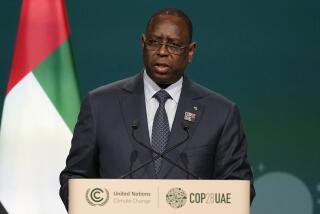No Delay for Iraqi Elections
- Share via
Every suicide bombing in Iraq these days brings new calls for a postponement of national elections scheduled for Jan. 30, less than four weeks away. Those demanding a delay are usually Sunni Muslims -- who’ve lost the power they held under Saddam Hussein. But the voices include well-wishers outside the country worried that an election boycotted by a community accounting for 20% of the population would permanently cripple representative government. That need not happen.
Delaying balloting for a 275-member interim national assembly that will write an interim constitution and then yield to a permanent legislature in another round of elections later in the year would give terrorists the power to decide if or when elections will be held. A delay would not guarantee that security would improve; it could worsen. Nor would it ensure that Sunni politicians would eventually participate; it might simply embolden them to demand further delays. And a postponement would let insurgents continue to rail against a government picked by Washington.
A delay would also betray the Shiite Muslims, who account for 60% of the Iraqi people and who suffered greatly under Hussein. They have been largely disenfranchised since the nation was chiseled from the remnants of the Ottoman Empire after World War I. The current Baghdad rulers were installed by the U.S. in June; their lack of legitimacy adds fuel to the insurgency. One reason Osama bin Laden’s latest audiotape urges Sunnis to boycott the election is that he doesn’t want to see a government in Baghdad that can claim legitimacy.
Much of the U.S. debate over the January vote is too quick to dismiss the fact that the election was promised to the Iraqi people, and that they would read into any change sinister motives on Washington’s part. Grand Ayatollah Ali Sistani, the Shiite religious leader, is certainly counting on the vote taking place, and he has issued a religious decree instructing his followers to go to the polls. The main Shiite slate includes Sunni and ethnic Kurd politicians, but most of its candidates are Shiites, who are widely expected to win the most seats in any election, fair or flawed.
The Bush administration and the interim prime minister, Iyad Allawi, are steadfast in their determination to see the election occur on Jan. 30 and to encourage Sunnis to participate, despite the danger. Campaigning when insurgents are trying to kill you ranges from difficult to suicidal; the elections will not reflect a Jeffersonian democracy. Attacks on polling places are likely. Even under the best conditions, Sunnis are likely to be underrepresented when the votes are tallied.
Clearly worried, President Bush and Allawi are floating the idea of establishing a quota for Sunnis if the minority voter turnout is abysmal. Perhaps 20% or 25% of the seats in the transitional assembly would be set aside for Sunnis. That need not be a permanent solution, but it would recognize the exceptional nature of this election.
The new Iraqi government will have to address the rights of Sunni and Kurdish minorities if it is to succeed, and it should exhort more Iraqis to enlist in the army and police forces, so U.S. forces can start withdrawing.
The Bush administration points to a democratic Iraq as a beacon for the Arab nations of the Middle East. That is a laudable goal, but the imperative short-term need is to at least establish a government in Baghdad that can claim some legitimacy from Mosul to Basra, and that will make most Iraqis feel they have regained their sovereignty.
More to Read
Sign up for Essential California
The most important California stories and recommendations in your inbox every morning.
You may occasionally receive promotional content from the Los Angeles Times.










